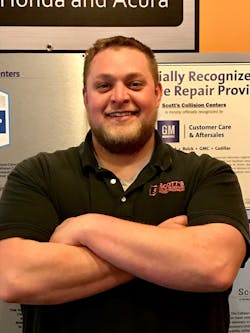At 6’2”, 280 lbs, Josh “Tiny” Miller (the nickname is a bit of a misnomer) is hard to miss. In fact, Miller remembers a time that a co-worker of his at Carstar Stroudsburg (one of four CARSTAR locations in the Pennsylvania area owned by Legacy Autobody Group) commented in awe at how Miller ran around the shop.
“He told me that he had never seen a manager run around the way I did,” Miller says. “He then told me, ‘If he can do it, I can do it.’”
Even though this staff member was inspired by Miller’s actions, he’s quick to throw the praise right back to his team, which is made up of four technicians, two painters, a detailer, a production manager, a full-time mechanic, a parts manager, a CRS and an estimator.
“We’ve got a great crew,” Miller says. “Everyone is phenomenal. We built one hell of a team, and we’re still building it.”
Miller, who started at the shop in body, moved up the ladder to become production manager and for the last year and a half, has been the shop’s manager. Serving in different positions, Miller knows the type of people that he needs to fill each position in order to be successful. Take Billy Matejcek, for example, who was Miller’s choice to fill his previous position and take over as production manager.
“We talked before the transition happened,” Miller says. “He’s a very good tech, he did quality work. Together, we decided we were going to make changes happen.”
Since the two joined forces and moved into their new positions, the shop, which is one of four CARSTAR locations in Pennsylvania owned by Legacy Autobody Group, boasts average monthly sales of $250,000. To what does Miller attribute his shop’s success? His staff, of course.
Leading the shop, it’s myself and Billy. Our biggest thing is getting the right people in the right place. Our best month, we did $334,000 in sales. We were able to do that because we have the right people and we know of what each person is capable.
When we’re looking to hire someone, we’re very selective. I can’t stand drama. One bad egg can spoil the rest. I tell people upfront that I don’t deal with drama. I look for skill, obviously, but there are certain people that can be molded into what you need without all of the necessary skills up front.
When I get into the shop, most of the body and paint staff is already there. I get in around 7 a.m. I check my messages, get everything started and then I call Billy and our estimator, Matthew, down. We talk about what’s going on for the rest of the day. We print out a sheet for every car in the shop with information on it like when it’s due out, parts and any other updates. This probably take half an hour.
On Mondays and Wednesdays, we have a big production meeting for the entire shop. Billy is a huge part of this. He created the production board that we gather around and reference. The board lists each tech, the vehicles that have been assigned, and where it’s at in the repair stage.
A Production Manager's Tips for Running a Successful Shop
—
Billy Matejcek, production manager at CARSTAR Stroudsburg in Stroudsburg, Penn., shares what he’s learned about running a successful operation
“There’s no one right way, but there are a few basic components that you need in order to manage a successful body shop,” Matejcek says. “It’s all about finding what works for you.”
Put the Right People in The Right Place.
Matejcek and Josh Miller share this sentiment. Matejcek says that if the right people are placed in the right positions and have pride in what they do, everything else will fall into place.
“It takes each gear to be as strong as the next to make the machine run smoothly and in unison,” Matejcek says.
If the people aren’t a good fit, Matejcek says that owners or people in charge should not be afraid to hire or fire, no matter how long that employee has been there.
Implement a Process.
Beyond the people, it’s the process that Scott’s has in place that has allowed the shop to do so well in sales. Matejcek says that Scott’s success starts with the front office.
“The mentality of your front office estimators should be to write the estimate in such a way that the vehicle can go from disassembly to paint without stopping,” Matejcek says.
Matejcek says that the key to a good cycle time is all in the teardown. A 100 percent teardown must be completed.
“Everyone hates it when a car is due out and at the last second, you find out that you have the wrong headlight or need an additional part,” Matejcek says.
Problems like that can be avoided from the start with a diligent repair process that includes a 100 percent teardown.
For the parts department, Matejcek says that it’s essential to have someone in the department that is really on top of it. He or she should be working to find the closest parts possible, because this will decrease cycle time. Mirror matching parts is also something that Matejcek says should be done right away in the parts department.
The goal of everyone at the shop should be to find a system that doesn’t stop or slow down the process.
Communicate, Communicate, Communicate.
Matejcek says that once the vehicle is in the shop, communication is the key to the success of that repair.
“Your techs need to know what exactly is going on with the vehicle that he or she is working on,” Matejcek says. “This includes parts, supplements, and so forth. Your job [as a member of the leadership team] is to provide the technicians with the tools that they need to complete the repairs and they won’t know what those are unless you tell them.”
In order to ensure this is done, two production meetings are held per week to inform the technicians of any hold-ups and what is needed to be done on each vehicle.
Knowing what each guy can do and what to do at each stage is so important. During the teardown, you need to get supplements up front and get those parts. It’s all about keeping on top of problems. By taking the time to prepare ahead of time, it’s easier to avoid the day-to-day issues that slow repairs down.
If we meet our sales goals for the month, Billy and I will go and buy the guys an awesome lunch. It’s a great way to get together and keep morale up.
Something I really stress with my team is that honesty is key. Especially when it comes to customers. Let them know right away if there’s an issue. They’ll be much more understanding if you tell them up front. Call the customer right away. An apology goes a long way.
After we’ve set ourselves up for the day, my tasks vary day to day. I’ll help out anyone that needs it or work on any paperwork that falls on my desk. Customer updates are very important to us, we actually won an award—Best in Class Service from the Business Council—for our updates. I make sure that customers are being updated daily. Each of our customers should feel like his or her vehicle is the only one in the facility. When a customer first comes in, we have them fill out an information sheet that lets us know his or her preferred method of contact. I’ll usually call either way to create a more personal connection.
Before I leave, I make sure that all of my paperwork for the day is complete—my desk has to be totally cleared off before I leave. Then, I look over the production schedule and I get everything set that I need to for the next day. The shop closes at 5, but I’ve never left that early.
I work those extra hours by choice. I’m very dedicated. Matt [Dewalt, co-owner of Legacy Autobody Group] gave me this opportunity. He believed in me and I’m not going to let him down.

